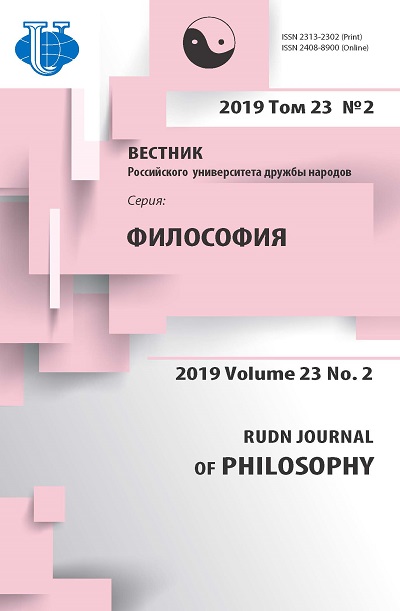ON THE IMAGINATIVE COMPONENT OF (LATIN) AMERICAN IDENTITY DISCOURSE
- Authors: Bondar O.Y.1
-
Affiliations:
- Peoples’ Friendship University of Russia (RUDN University)
- Issue: Vol 23, No 2 (2019)
- Pages: 230-239
- Section: SOCIAL PHILOSOPHY
- URL: https://journals.rudn.ru/philosophy/article/view/21510
- DOI: https://doi.org/10.22363/2313-2302-2019-23-2-230-239
- ID: 21510
Cite item
Full Text
Abstract
The discovery of America was one of the major events that determined the establishment of the world-historical process. However, for a long time this large-scale and all-important phenomenon, as well as the concept itself, was interpreted strictly in accordance with the Eurocentric attitudes and assessments of history. The European outlook tended to review the ambiguous, heterogeneous in its content, and accompanied by contradictions phenomenon in narrow geographical, political, economic, and epistemological perspectives. The usual interpretation lacked the cultural-historical, philosophical, and cultural meanings. The author of the article attempts to fill the lost meanings and to expand the very meaning of the concept of “the discovery of America” by changing perspectives - from the European to the (Latin) American one, in which the concept reaches a new interpretative level by having defined the continent-wide culture-forming strategy, and is able to absorb many meanings of self-identification of the subject involved in the global historical process.
About the authors
O. Yu. Bondar
Peoples’ Friendship University of Russia (RUDN University)
Author for correspondence.
Email: bondar_oyu@rudn.university
кандидат философских наук, доцент, доцент кафедры социальной философии Российского университета дружбы народов
Miklukho-Maklaya St, 6, Moscow, Russia, 117198References
- Aínsa F. Anticipation, Discovery and Invention of America. In: The Chronicles of the Discovery of America 500 years. Anthology. Мoscow: Nasledie; 1998. (In Russ.).
- Aínsa F. The Reconstruction of Utopia: Essays. Moscow: Nasledie; Éditions UNESCO, 1999. (In Russ.).
- Anderson B. Imagined Communities. Moscow: Kuchkovo Pole; 2016. (In Russ.).
- Hegel GWF. Lectures on the Philosophy of History. St. Petersburg: Nauka; 1993. (In Russ.).
- Girin YN. Imagination as a Culture-Forming Factor. In: Iberica Americans. Latin American Culture in the Discussions of the Late 20th — Early 21st centuries. Moscow: IMLI RAN; 2009. (In Russ.).
- Zemskov VB. On Literature and Culture of the New World. Moscow: Center of Humanitarian Initiatives; 2014. (In Russ.).
- Mannheim K. Utopia and Ideology. In: Utopia and Utopian Thinking. Moscow: Progress; 1991. (In Russ.).
- Nadyarnih MF. Invention in Latin American Culture. In: Iberica Americans. Latin American Culture in the Discussions of the Late 20th — Early 21st centuries. Moscow: IMLI RAN; 2009. (In Russ.).
- Nadyarnih MF. Mythology of Naming: The Experience of Latin American Literature. Izvestia RAN, Series of Literature and Language. 2014;73(2). (In Russ.).
- Zea L. The Meaning of History: from dependence to solidarity. Culture: Dialogue of the Nations, Latin America: Nations and Culture. 1986;(3). (In Russ.).
- Ardao A. Génesis de la idea y el nombre de América Latina. Caracas: Centro de estudios latinoamericanos Rómulo Gallegos; 1980.
- Dussel E. 1492. El encubrimiento del Otro. Hacia el origen del “mito de la Modernidad”. La Paz: Univ. De San Andrés; 1994.
- Frost EC. Las categorías de la cultura mexicana. México: UNAM; 1974.
- Larroyo. La filosofía Iberoamericana. Historia, formas, temas, polémica, realizaciones. México: Editorial Porrúa; 1978.
- O’Gorman E. La invención de América: investigación acerca de estructura histórica del Nuevo Mundo y del sentido de su devenir. México: F.C.E.; 1984.
- Paz O. El Arco y la Lira. México; 1967.
Supplementary files















